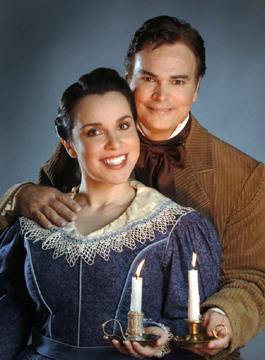 Sandra Lopez\r\nand Marcus Haddock made FWO’s\r\nmost recent\r\n‘La Bohème’\r\na work of art.
Sandra Lopez\r\nand Marcus Haddock made FWO’s\r\nmost recent\r\n‘La Bohème’\r\na work of art.
|
|
A D V E R T I S E M E N T
|
|
|
|
A D V E R T I S E M E N T
|
|
Virtuosos of Virtue
In Fort Worth Opera’s latest production of La Bohème, love, life, and art are manifest in some tremendous singing.
By LEONARD EUREKA
Puccini’s La Bohème, a gritty tale of struggling young lovers in 19th-century Paris, has wowed viewers for generations. The Fort Worth Opera revives the work every five years or so, with strong, youthful voices usually carrying the day.
Last weekend at Bass Performance Hall, the company put on three performances with two different casts — they were all making their Fort Worth Opera debuts. The first cast featured a top-notch tenor for the romantic lead of Rodolfo. Fort Worth-born and Lubbock-raised Marcus Haddock regularly performs with major opera companies in America and abroad. (With the Dallas Opera in recent seasons, he was the Duke in Rigoletto and Alfredo in La Traviata.) His bright, robust instrument carries effortlessly over the thickest ensembles, and his easygoing stage presence is engaging. In his local debut this past weekend, he easily won new fans here.
Though she’s not in the same league yet, soprano Sandra Lopez, as Rodolfo’s Mimì, was last seen locally as Tatiana in Eugene Onegin during the Fort Worth Symphony’s 2004 Tchaikovsky Festival. While she’s had trouble keeping her voice under total control, she’s gotten better. But the top still spreads under pressure, and she seems reluctant to trust the carrying power of pianissimos.
Back in 1970, Plácido Domingo celebrated his 30th birthday here by singing Rodolfo with young Mexican soprano Gilda Cruz Romo as his Mimì — a magic pairing. The two went on to major careers, eventually singing together in a season-opening production of Verdi’s Otello for the Metropolitan Opera.
For the Saturday performance, the second cast had something of a déjà vu quality. Young tenor Stephen Costello and soprano Christina Major brought back memories of the earlier singers. At 24, Costello was making his operatic stage debut, and his voice, solid from top to bottom, has a radiant bloom. His musical instincts are well formed, he’s comfortable onstage, and the promise of future greatness was all over the performance. If he resists the lure of taking on bigger roles too soon and allows his voice to fill out and the top to strengthen, there may be an important career ahead of him.
A powerful vocalist, Major also gave a sensitive performance. Though the top of her register has a tendency to dissolve when she attempts gentle sounds, she brought musical clarity and dramatic security to the role. A subtle chemistry between the singers lent an appealing, vulnerable quality to their relationship.
The Musetta for all three performances was Nicole Heaston, who was at a serious disadvantage. Six months pregnant, she tried to disguise the fact under a bulky costume and succeeded only in looking enormous. (And why the stage director had her stand on a skimpy chair during the café scene is anyone’s guess.) She still managed a spitfire portrayal of the woman scorned, and her voice was in excellent shape.
Baritone Erik Nelson Werner, winner of the 2003 Marguerite McCammon Voice Competition, sponsored by the Fort Worth Opera Guild, sang Marcello, friend of the lovers and sometime partner to Musetta. His sound is healthy and full-bodied, and he uses it with conviction and musical awareness. You wonder what he’d sound like in a more complex role.
His buddy, Colline, was tall, lanky basso Derrick Parker, whose voice has a unique-sounding core, almost like molten amber, and it adds beauty and interest to his singing.
Staging the opera, David Gately omitted the parade in the second act and left the Customs Gate in the third act unattended much of the time, but he otherwise let the story unfold in a natural way without fuss or feathers. Under Joe Illick’s direction, the Fort Worth Symphony in the pit seemed particularly sympathetic to Puccini’s lyrical line.
Between performances, on Saturday afternoon, was the final round of the latest edition of the McCammon Voice Competition. Ten finalists competed for a first prize of $10,000 and a role with the company, a $5,000 second prize, and $3,000 for third place.
The winner was bass baritone Michael Todd Simpson from North Carolina, another tall, loose-limbed singer with a wingspan like a condor. His introspective reading of Silvio’s aria from Pagliacci and an aria from Britten’s Billy Budd didn’t appear to stand a chance against all of the vocal fireworks going on. But the jury singled him out, even in the face of Korean tenor Dongwon Shin’s heroic account of “Nessun dorma” from Turandot, which blew most audience members away. Shin, who also belted out “Celeste Aïda,” was awarded second prize. Don’t be surprised if he appears with the Fort Worth Opera sometime soon.
The most glamorous-looking of all the singers, mezzo soprano Jennifer Holloway — a tall, svelte, long-haired blonde — took third place after delivering a noteworthy account of a coloratura-filled aria from Handel’s Serse (once known as Xerxes). Her body seemed stiff, but her singing, though devoid of baroque ornamentation, was accurate and impressive.
You can read staff writer Kristian Lin’s account of the entire competition at www.fwweekly.com.
 Email this Article...
Email this Article...

